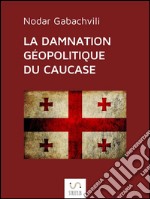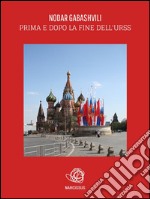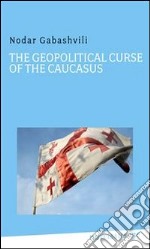Nodar Gabashvili eBooks
eBooks di Nodar Gabashvili di Formato Mobipocket
La damnation géopolitique du Caucase. E-book. Formato Mobipocket Nodar Gabashvili - Nodar Gabashvili, 2016 -
Au début du livre, l'auteur avait l'intention d'expliquer les raisons de l'implosion de l'URSS, ce qui était nécessaire pour comprendre bien les événements ultérieurs dans le Caucase post-soviétique. L'auteur écrit sur les aspects les plus importants de la politique envers les minorités ethniques dans le Caucase par l'autocratie tsariste et l'Etat communiste soviétique. C' était nécessaire pour comprendre bien la stratégie dans la région des dirigeants russes post-soviétiques, B.Eltsine et V. Poutine, après la dissolution de l'URSS. Dans ce manuscrit, l'auteur s'est efforcé d'élucider les raisons, les particularités et les conséquences des conflits dans le Caucase post-soviétique et, tout d'abord, en Tchétchénie et en Géorgie. Il a également l'intention de montrer que les conflits dans le Haut - Karabagh, l'Ossétie du Sud, l'Abkhazie et la Tchétchénie, les régions séparatistes du Caucase, étaient les événements liés entre eux. Le fait est qu'après avoir utilisé les mouvements démocratiques et libéraux de la Géorgie, des Etats baltes et de la Russie pour démanteler le Parti communiste et l'Etat soviétique, B.Eltsine, président de la Fédération de Russie, a commencé la politique traditionnelle de domination de la Russie dans le Caucase du Sud. La domination du Caucase du Sud et d'autres parties de l'ex-URSS était une mesure pour confirmer le statut de grande puissance, une politique nécessaire pour stimuler le nationalisme impérial russe, utilisé comme un substitut de l'idéologie communiste. En tant qu'historien et journaliste, l'auteur donne une analyse de nombreux matériaux sur le sujet écrit en plusieurs langues. Le fait que l'auteur a été un témoin de nombreux événements dans le Caucase est une occasion pour mieux comprendre les événements qui sont peu connus jusqu'à présent. C'est pourquoi certains aspects des événements dans la région, comme ceux de la Géorgie, sont soumis à une sorte de conspiration du silence. L'auteur de ce livre est un journaliste et un historien de la Géorgie, qui était autrefois une des républiques de l'Union Soviétique. Il a participé au mouvement indépendantiste et libéral de la Géorgie qui a remporté en 1991 les premières élections multipartites. Il est devenu vice-ministre des affaires étrangères du gouvernement qui a déclaré l'indépendance de la Géorgie de l'URSS. Après la suppression par la force de ce gouvernement, il a été forcé de quitter son pays natal. À partir de 1995, il a vécu à Rome sous la protection du Vatican et puis il a obtenu l'asile politique de l'Italie. En Italie il a publié plusieurs livres sur l'histoire et relations internationales: «Le Caucase et la Yougoslavie: les guerres oubliées et les pacifications précaires». Stango Editore. 2001, Rome; Géorgie et Rome. 2000 ans de dialogue entre chrétiens ', Libreria Vaticana, 2003. Rome. ' The Geopolitical Curse of the Caucasus.', amazon.it; 2013 ' Avant et après la fin de l'URSS',.amazon.it, 2015
Prima e dopo la fine dell'URSS. E-book. Formato Mobipocket Nodar Gabashvili - Nodar Gabashvili, 2015 -
Nel libro l'autore cerca di far luce sulle ragioni, l'andamento e le conseguenze dei conflitti in Abcasia, Nagorno Karabakh, Cecenia, Georgia. I materiali del manoscritto permettono di fare la conclusione che la Georgia ed il Caucaso in generale sono stati per il Cremlino una sorta di poligono per sperimentare alcune idee politiche e militari. La guerra dell'agosto del 2008 e la conseguente spartizione della Georgia è stata una sorta di un esperimento politico per testare la reazione dell'Occidente alle sue azioni. Il fatto sta che la reazione alla guerra in Georgia in Occidente è stata riservata e conciliante ha stimolando il Cremlino di compiere l'annessione di Crimea. Tutta la politica del presidente Putin ha avuto per lo scopo di costruire l' Unione eurasiatica, una sorte di Stato unitario di tipo sovietico che avrebbe compreso alcune caratteristiche dell'impero zarista. Ecco perché nel capitolo “ Il passato che non passa mai” del manoscritto l'autore ha voluto rilevare le caratteristiche principali del sistema politico dell'impero zarista e del comunismo sovietico. Come si evince dal libro, la politica di revisionismo geopolitico di Cremlino si basa sulla mobilitazione nazionalista per creare ilconsenso interno. E tale strategia rappresenta la continuazione della linea ideologica e geopolitica tracciata all'epoca di Eltsin. I paesi occidentali hanno fatto bene, dando la mano ed aiuto al popolo russo per riprendersi dopo la fine dell'URSS. Tale aiuti venivano stimolati dal fatto che la dirigenza di Eltsin dichiarava la riconciliazione con l' Occidente e l' avvio verso la democrazia. Eppure in verità ciò erano solo le parole. Ecco perché l'autore deciso di includere nel libro il capitolo 'L'Occidente e la Russia (l'URSS): dalla guerra fredda alla pace fredda”. Ciò potrebbe aiutare a capire alcune scelte occidentali nei confronti della Russia, dopo il crollo dell'URSS, che si sono rivelate di esito negativo. In questo capitolo l'autore scrive anche del comunismo in Italia e della sua influenza su molti aspetti della vita politica e storia recente dell' Italia, di cui conseguenze si vedono anche oggi. Bisogna sottolineare che l' autore è giornalista e storico della Georgia. Ha scritto molto sui temi della politica e storia d'Italia, quando lavorava al Dipartimento della storia d Europa dell'Istituto di storia dell'Accademia di scienze della Georgia. Nel 1990-1991 fu il vice ministro degli Affari Esteri, quando il governo indipendentista della Georgia aveva dichiarato indipendenza dall'URSS. Nel 1996 arrivò in Italia invitato dal Vaticano. Poi ha avuto l'asilo politico dal governo italiano. Tra le sue pubblicazioni in Italia ci sono i libri: “Caucaso, Jugoslavia: guerre dimenticate e paci precarie”, Stango editore, Roma, 2001; “Georgia e Santa Sede. Duemila anni di dialogo tra i cristiani', Libreria Vaticana, Roma, 2003; “La maledizione geopolitica del Caucaso” (in lingua inglese), Narcissus, 2013.
The Geopolitical Curse of the Caucasus. E-book. Formato Mobipocket Nodar Gabashvili - Nodar Gabashvili, 2013 -
At the beginning of the book the author intended to explain the reasons of the break up of the USSR, which was necessary to understand well subsequent events in the Caucasus. The author writes of the most important aspects of the policy towards ethnical minorities in the Caucasus by the Tsarist autocracy and the Soviet Communist state. It was necessary to understand well the strategy in the region of Russian post soviet leaders Yeltsin and Putin, after the break up of the USSR. In this manuscript the author made an effort to elucidate the reasons, particularities and consequences of the conflicts in the post Soviet South Caucasus and, first of all in Chechnya and Georgia. He also intended to show that the conflicts in Mountainous Karabakh, South Ossetia, Abkhazia and Chechnya, the separatist regions of the Caucasus, were the events linked between them. The fact is that after having used the democratic and liberal movements of Georgia, of Baltic states and of Russia as a measure to dismantle the Soviet Communist party and the Soviet state, Yeltsin, the president of Russian Federation, began Russia’s traditional policy of dominance of the South Caucasus. The dominance of the South Caucasus and other parts of the former USSR was a measure to confirm the Great power status, a policy necessary to aliment Russian imperial nationalism, used it as a substitute of the communist ideology. Being a historian and journalist, the author gives an analysis of many materials on the subject written in various languages. The fact that the author was a witness to many events in the Caucasus is an opportunity for readers of this book a to better understand the events that are little known so far. This is why some aspects of the events in the region, like those of Georgia, are subjected to a kind of conspiracy of silence. The theme of the Caucasus is important, since the so-called frozen conflicts in the Caucasus, such as in the Mountainous Karabakh, could erupt at any time, which could involve Russia, Iran and Turkey. The author of this book is a journalist and historian from Georgia, which once was one of the republics of the Soviet Union. He participated in the independence and liberal movement of Georgia that won in 1991 the first multiparty elections. He became a Vice Minister of Foreign affairs of the government that declared independence of Georgia from the USSR. After the removing by force of this government he was forced to leave his native country. From 1995 he lived in Rome at first under protection of Vatican and then he was granted political asylum from Italy. Im Italy he has published several a books on history and international relations: “Caucasus and Yugoslavia: Forgotten Wars and Precarious Pacifications“. Stango Editore. 2001, Rome; “Georgia and Rome. 2000 Years of Dialogue between Christians“. Libreria Vaticana, 2003. Rome.


